| Listing 1 - 7 of 7 |
Sort by
|

ISBN: 0807739758 080773974X Year: 2000 Publisher: New York : Teachers College Press,
Abstract | Keywords | Export | Availability | Bookmark
 Loading...
Loading...Choose an application
- Reference Manager
- EndNote
- RefWorks (Direct export to RefWorks)
American literature --- Criticism --- English literature --- Literature --- Study and teaching (Secondary). --- History and criticism --- Theory, etc
Book
ISBN: 9781324019183 Year: 2022 Publisher: New York Norton
Abstract | Keywords | Export | Availability | Bookmark
 Loading...
Loading...Choose an application
- Reference Manager
- EndNote
- RefWorks (Direct export to RefWorks)
"Can educators continue to teach troubling but worthwhile texts? Our current "culture wars" have reshaped the politics of secondary literature instruction. Due to a variety of challenges from both the left and the right-to language or subject matter, to potentially triggering content, or to authors who have been canceled-school reading lists are rapidly shrinking. For many teachers, choosing which books to include in their curriculum has become an agonizing task with political, professional, and ethical dimensions. In Literature and the New Culture Wars, Deborah Appleman calls for a reacknowledgment of the intellectual and affective work that literature can do, and offers ways to continue to teach troubling texts without doing harm. Rather than banishing challenged texts from our classrooms, she writes, we should be confronting and teaching the controversies they invoke. Her book is a timely and eloquent argument for a reasoned approach to determining what literature still deserves to be read and taught and discussed"--
Sociology of culture --- Didactics of social education --- maatschappijkritiek --- politiek --- lezen --- leesonderwijs
Book
ISBN: 9781138891241 113889124X Year: 2016 Publisher: New York Routledge
Abstract | Keywords | Export | Availability | Bookmark
 Loading...
Loading...Choose an application
- Reference Manager
- EndNote
- RefWorks (Direct export to RefWorks)
Literature --- Study and teaching (Secondary) --- Didactics of Dutch --- literatuurstudie
Book
ISBN: 9780367366223 9780367366209 Year: 2021 Publisher: New York, NY : Routledge,
Abstract | Keywords | Export | Availability | Bookmark
 Loading...
Loading...Choose an application
- Reference Manager
- EndNote
- RefWorks (Direct export to RefWorks)
"Now in its fourth edition, this popular textbook introduces prospective and practicing English teachers to current methods of teaching literature in middle and high school classrooms. This new edition broadens its focus to cover important topics such as critical race theory; perspectives on teaching fiction, nonfiction, and drama; the integration of digital literacy; and teacher research for ongoing learning and professional development. It underscores the value of providing students with a range of different critical approaches and tools for interpreting texts. It also addresses the need to organize literature instruction around topics and issues of interest to today's adolescents. By using authentic dilemmas and contemporary issues, the authors encourage pre-service English teachers and their instructors to raise and explore inquiry-based questions that center on the teaching of a variety of literary texts, both classic and contemporary, traditional and digital.^ A Companion Website, a favorite of English education instructors, [http://teachingliterature.pbworks.com] provides resources and enrichment activities, inviting teachers to consider important issues in the context of their current or future classrooms"-- New to the Fourth Edition: Expanded attention to digital tools, multimodal learning, and teaching online New examples on teaching contemporary texts Expanded discussion and illustration of formative assessment Revised response activities for incorporating young adult literature into the literature curriculum Real-world examples of student work to illustrate how students respond to the suggested strategies Extended focus on infusing multicultural and diverse literature in the classroom Each chapter is organized around specific questions that pre-service teachers consistently raise as they prepare to become English language arts teachers. The authors model critical inquiry throughout the text by offering authentic case narratives that raise important considerations of both theory and practice.^
Book
ISBN: 9780545052566 0545052564 Year: 2010 Publisher: New York (N.Y.) : 2010, Scholastic ;
Abstract | Keywords | Export | Availability | Bookmark
 Loading...
Loading...Choose an application
- Reference Manager
- EndNote
- RefWorks (Direct export to RefWorks)
Offers tools and strategies for teaching literary elements to middle and high school students, covering character, theme, point of view, and setting, and including activities.
Literature --- Language arts (Secondary) --- Comparative literature --- Character in literature. --- Setting (Literature). --- Character. --- Language arts (Secondary). --- Literature. --- Study and teaching (Secondary). --- Themes, motives. --- United States.
Book
ISBN: 1483320456 1483333531 1483333485 1483333493 9781483320458 9781483333533 9781483333489 9781483333496 Year: 2014 Publisher: Thousand Oaks, California : Corwin Literacy,
Abstract | Keywords | Export | Availability | Bookmark
 Loading...
Loading...Choose an application
- Reference Manager
- EndNote
- RefWorks (Direct export to RefWorks)
Leave instruction to the experts!
Common Core State Standards (Education) --- Education --- Teaching --- Standards
Book
ISBN: 9781071854655 Year: 2023 Publisher: Thousand Oaks, CA Sage Publications Ltd
Abstract | Keywords | Export | Availability | Bookmark
 Loading...
Loading...Choose an application
- Reference Manager
- EndNote
- RefWorks (Direct export to RefWorks)
fake news --- critical thinking --- critical reading --- digital media --- social media --- cognitive bias --- online reading --- information research --- fact and fiction --- evidence --- evaluation --- digital texts
| Listing 1 - 7 of 7 |
Sort by
|

 Search
Search Feedback
Feedback About UniCat
About UniCat  Help
Help News
News